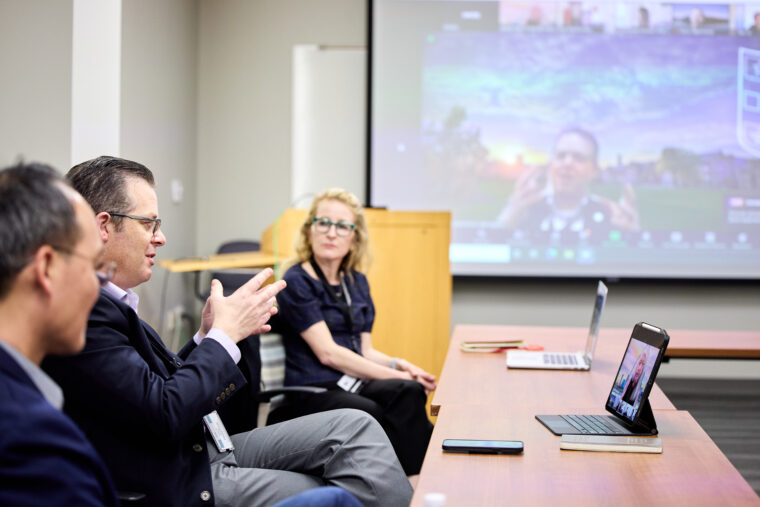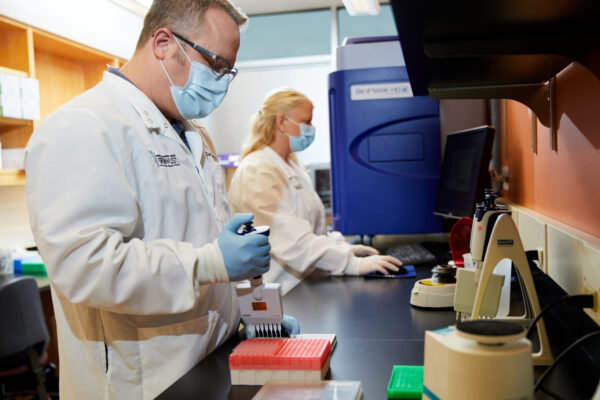As part of its strategic vision, “Here and Next,” Washington University in St. Louis has committed to mobilizing research, education and patient care to establish WashU, and St. Louis, as a global hub for transformative solutions to our deepest societal challenges. The latest milestone: launching WashU’s Digital Transformation initiative.
“Digital technology is transforming our society in ways we’re just beginning to understand,” said Beverly Wendland, provost and executive vice chancellor for academic affairs. “Its use of data, analysis and tracking has made once-unimaginable tasks probable. Digital technology has the power to extend and save lives, revolutionize industry and store unlimited amounts of information. The initiative’s work is incredibly important, and I can’t wait to see what it accomplishes.”
Digital Transformation will touch many aspects of life at WashU: enhancing research excellence; strengthening digital learning experiences for students; and enabling optimized operations across schools and campuses. The initiative also will help position the university as a leader in addressing technological challenges and opportunities such as big data’s effect on public health, combating disinformation and developing trustworthy artificial intelligence (AI).
Philip R.O. Payne, the Janet and Bernard Becker Professor at the School of Medicine and founding director of the Institute for Informatics, Data Science and Biostatistics, will lead the initiative.
“During our listening tour, I’ve learned about work in every corner of the university that has the potential to be elevated by harnessing modern data, computing and communications technologies,” Payne said. “That’s why we’re building a community of faculty, staff and learners throughout WashU to advance digital transformation across all our missions.”
The Digital Transformation initiative includes several signature programs and priorities. Its institutional home, the Digital Intelligence & Innovation (DI2) Accelerator, provides centralization to digital efforts across the Danforth and Medical campuses. It will promote and increase digital activities at WashU via seed funding, special events and interdisciplinary collaborations. Albert Lai, a professor of medicine and chief research information officer, is the deputy faculty lead for Digital Transformation and a key leader for the accelerator.
“Together, we will improve student and employee experiences, adopt new approaches to teaching and learning, invest in new technologies like artificial intelligence, machine learning and data analytics, and change internal and external processes,” Lai said. “Digital transformation can benefit our society through the tremendous advances in research that can happen through new data science technologies and approaches. We will also disseminate these new advances to the public, for the good of all.”
Within the DI2 Accelerator, the Digital Solutions Studio will reach across schools and disciplines to better connect people with digital resources, to accelerate the pace of WashU research and to expand computing abilities. The studio also will enable WashU faculty and students to better leverage data to advance social good. One early success is the debut of an innovative St. Louis data visualization platform. Developed in partnership with Arts & Sciences, the platform allows WashU researchers, community members and regional stakeholders to track and compare datasets in categories as varied as health factors, election results and census information.
“This has been one of the most stunning collaborations of my academic career,” said Betsy Sinclair, a professor of political science in Arts & Sciences. “The Digital Solutions Studio listens so intensely to our team’s description of research that they are able to dream the same dream of where your research could go — and then build the tech to make that happen.”
The initiative also will establish strategic relationships with key industry partners to further boost interdisciplinary digital transformation efforts at WashU. Through a robust digital community that includes events, support for multidisciplinary projects and targeted faculty recruitment, WashU will establish itself as a national and global leader in the field.
“This critical work will harness our unique resources and expertise to responsibly and ethically address complex problems and advance science, engineering, public health, creative practice and so much more,” Payne said.
Learn more about the Digital Transformation initiative at WashU, and how to get involved, on the initiative’s website.



